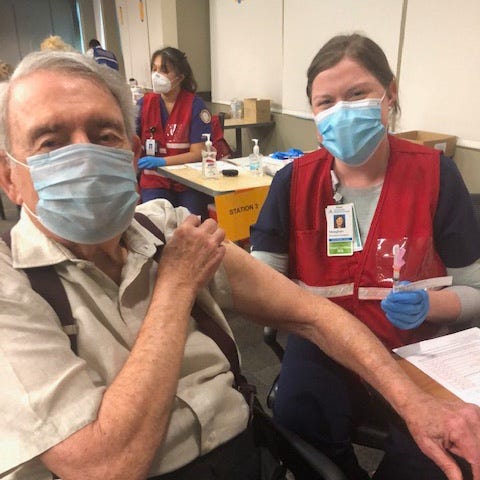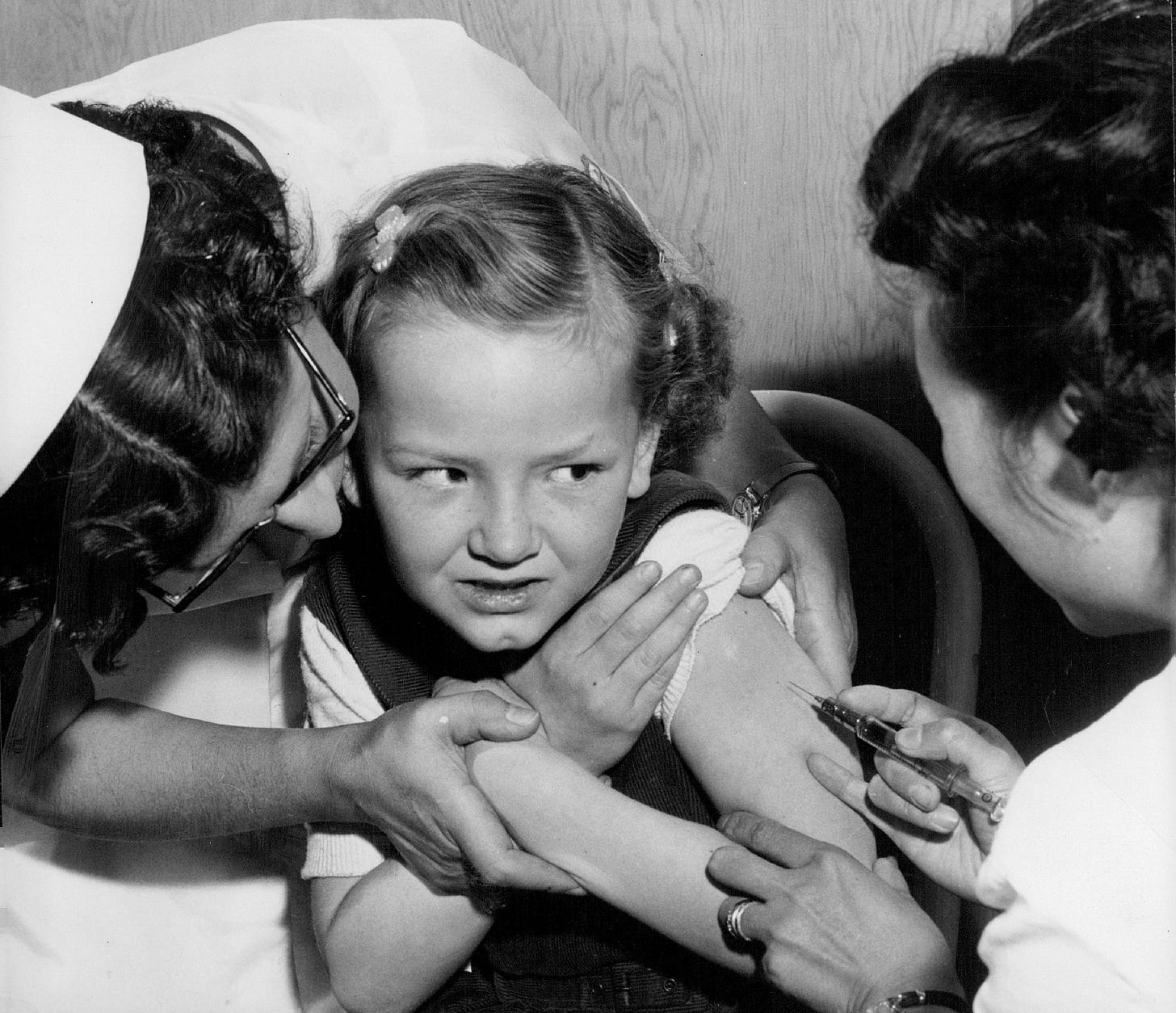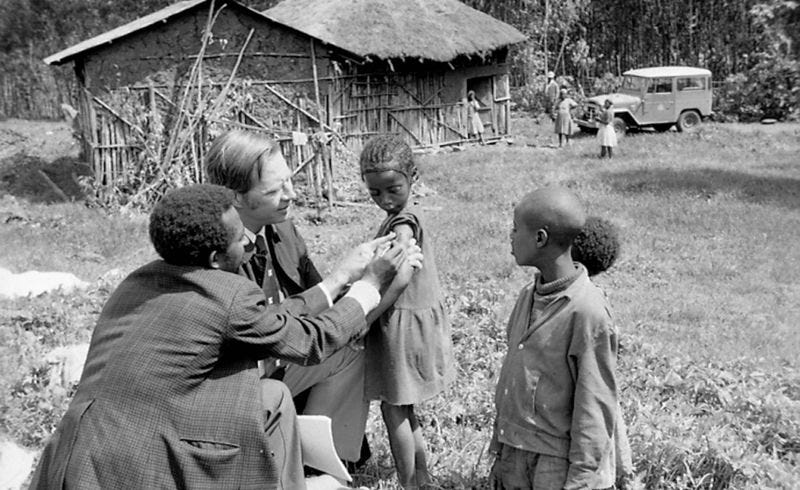When I was a child, polio was a scourge that was many mothers’ (and fathers’, and siblings’, and society's) worst nightmare. It struck with devastating effects, stalking children with the risk of irreparable harm. And then, there was a vaccine, and it was a godsend. But it wasn't just that, it was also a "science-send."
I am thinking back to those days now, a time when I was just starting to climb the mountain of life. Now well into the back side of that mountain, another even-deadlier disease sweeps over the globe. And I, my wife Jean, and many of our family and friends, are at an age when it is particularly fatal. Once again, science is riding to the rescue in the form of a vaccine.
Maybe it is my age and experience, but I have never understood those who disparage vaccines. I've reported on the so-called “anti-vaccine movement” (anti-common sense or intelligence movement) since my days at CBS, in particular a special report on 60 Minutes. We got a lot of blowback. But as someone who has lived through the rise of modern vaccines, I stand firm and unwavering. And so should anyone who cares about our health and our common humanity. Vaccines are societal medicine. Yes they protect individuals, but in their aggregate, "the herd," they can protect communities and the world.
In our book "What Unites Us" I wrote about the eradication of smallpox:
The goal was to eradicate the deadliest killer known to man: smallpox. Like our voyages to the moon, this unprecedented public health mission was grounded in the audacious belief that our government could do something seemingly impossible, something that would change the course of human history.
In the twentieth century alone, an estimated three hundred million people had died of the disease, and we were determined to eliminate it entirely. The United States had been declared free of smallpox in 1949 after a major vaccination campaign. But the disease lingered, mostly in places we called the Third World at the time. The hope was that with proper determination and strategic deployments of public health workers, the entire world could be freed of a scourge that had been killing people by the millions since at least the time of the pharaohs in ancient Egypt. But there were many skeptics.
The effort was led by an unassuming epidemiologist from Ohio, D. A. Henderson (born just 150 or so miles away from a fellow Buckeye, Neil Armstrong). He had led a U.S.-sponsored vaccination program in West and Central Africa to great success. And many at the World Health Organization (WHO) took notice. There was a vote to see whether they should launch a global campaign, and the organization decided to do so by the slimmest of margins. The head of the WHO was livid, worried that the mission would be doomed to failure, much as what had happened with an earlier effort to eradicate malaria. So Dr. Henderson persuaded the United States to lead the effort to make sure his nation would feel responsible for success.
After a global campaign comprised of countless doctors, nurses, public health workers, and volunteers, smallpox was declared eradicated in 1980. It remains the only disease to have been fully defeated in the history of the planet.
The eradication of smallpox has been called the greatest medical event in human history. But the science behind it was relatively simple and well known. There had actually been a form of a smallpox vaccine since the eighteenth century; what was required was the ability to dream big, to work with others, and to see the destiny of the United States as improving the lives of those beyond our borders. This is the America of which I am exceptionally proud.
When news broke of a COVID-19 vaccine, in truths multiple vaccines, I couldn't wait to get one. I also know my privilege and felt compelled not to try to jump ahead in any line. I just wanted to know what line to get into. The rollout has been bumpy, as has been well documented. But we seem to be hitting a stride as a nation, and many individual states. I am happy to report that Jean and I both got our second shot the day before Valentine’s Day. It was the best gift I could ask for.

One important thing to note, is these vaccines are being branded by the companies that made them —Moderna, Pfizer, Johnson and Johnson, etc. It makes sense for product shorthand and marketing, but none of this would have been possible without the scientists working in basic research over decades. Their curiosity-driven research about how life works at its most foundational levels was devoid of accolades, generous compensation, or in some instances even job security. But their perseverance led to revolutionary new insights and vaccine technologies the world had never known. And now their work is saving the world.
It may sound a bit corny, but if you have read this far, indulge me. Stop for a moment. Think of the countless hours spent in labs by brilliant minds, and say (if you're inclined out loud even), "Yay, Science!"
—Dan
Please consider subscribing to STEADY, if you have not already. Our goal is to build a vibrant digital community —the more voices, perspectives, and viewpoints that can add to the conversation, the merrier.






My husband was a research scientist at a highly regarded university for years. Despite a PHD and 3 masters degrees from a top notch German university. and many publications, he only made $3,000 more per year than his secretary. He spent much of his valuable time chasing down grants because, without them, he'd lose his job. There were very few citizens in his various labs. They were mostly staffed by europeans and asians who were here for short stints to boost their resumes with US experience. These hard working foreign scientists were often paid at least in part by their native country because the universities didn't pay enough for them to live.
Why would a brilliant mind want to work in academia to live in near poverty? These individuals have discovered much of the most important information we have in science yet are treated very poorly. My husband didn't want to work for a pharmaceutical company, where the salaries are more in line with what his required education would indicate, because he felt he could be pressured to replace his scruples with a profit motive.
It is no wonder that we do not attract more citizens to science careers. True, some are paid nearly adequately in corporations, or in government, however, much of the basic medical research is conducted at universities where, if a scientist wants to live a decent life with a family, he's going to need a spouse who carries much of the financial responsibility for the family. This situation does not lead to us having all the scientific benefits that we could have if we would simply RESPECT SCIENCE AND SCIENTISTS. Living from grant to grant is no way for a genius to have to live his or her life.
As a retired microbiologist, I appreciate your vaccine advocacy. I sometimes feel like I'm beating my head against a wall when I try to engage with anti-vaxxers and I have mostly stopped trying. I have explained the mechanisms, debunked the myths, and appealed to their sense of protecting others, all to no avail. Even when they know I'm a microbiologist, I have been told, "I don't believe you." I have been called a shill for Big Pharma. The most I ever got from pharmaceutical companies was a few free lunches when they'd sponsor our required continuing education programs. Never did get that big payout from them for my promotion of vaccines for the common societal good!
It's dismaying for me and about all I'll say now if they happen to pop up in a conversation is "That's utter nonsense." Anything else is futile. I post the occasional article or graphic, but I'm preaching to the choir. One thing I've learned is that you can't educate someone who doesn't want to be educated. They have their set beliefs concerning vaccines (and so many other things, when you think about it) and if they hear anything that counters those beliefs, they dig their heels in even harder. At least I have had friends ask me about the Covid vaccines and want me to explain and allay their fears. I am more than happy to do that and I always say that as soon as I'm able, I will get mine.
The biggest excuse against the vaccine that people seem to have right now is that "it alters your DNA." ARGHHHH! No! It does not! The mRNA does not even enter your cells...it's "messenger" RNA which means that it just delivers the information to the cell and then the cell takes over to produce the protein that will trigger antibody production. It's all so frustrating and sometimes I feel like tearing my hair out! However, I take heart in knowing that the science behind the mRNA vaccines is sound and promises to be revolutionary when it comes to vaccine production. As a scientist, that is very exciting to me!